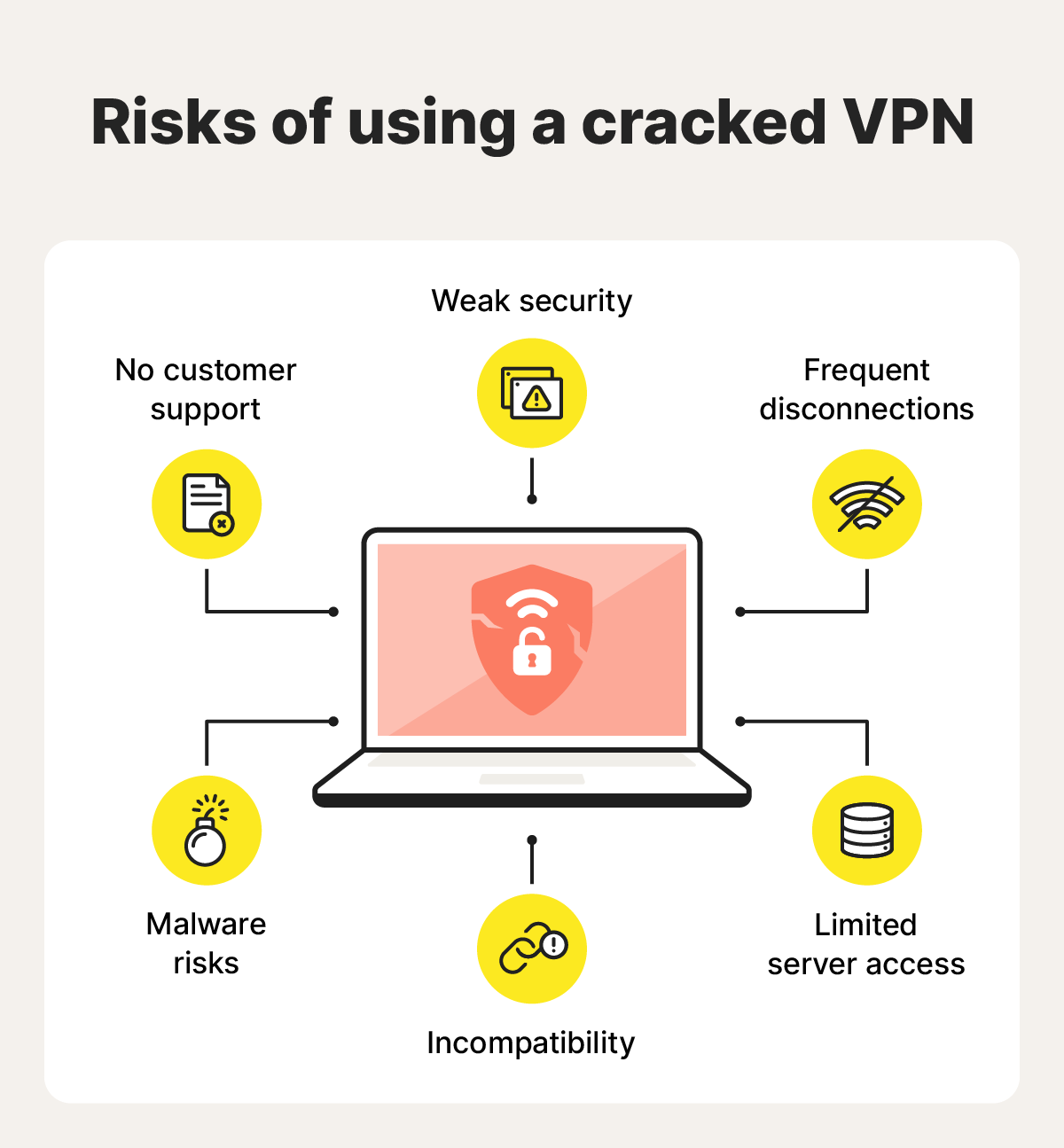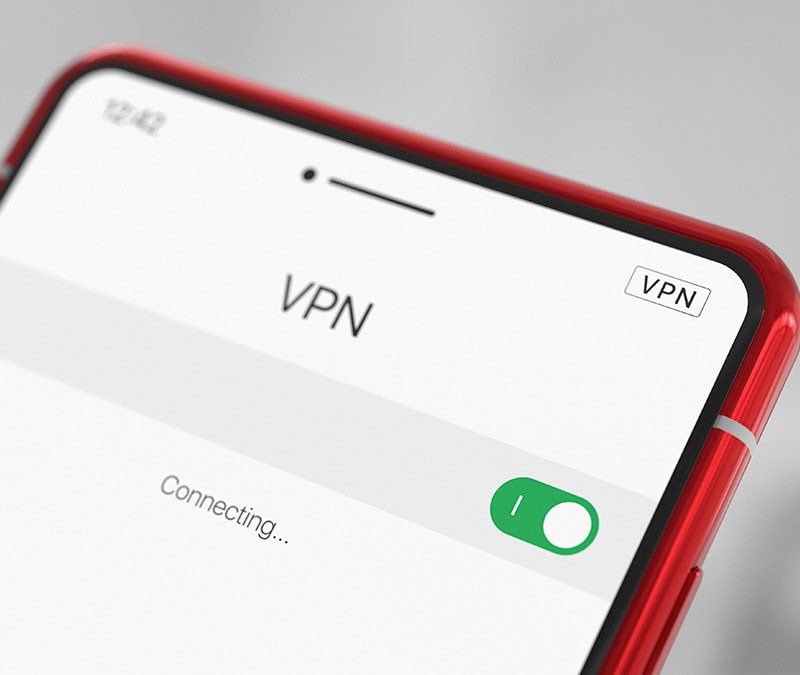What is a cracked VPN and is it safe to use one?
A cracked VPN may promise access to valuable online privacy and security features at no cost, but the risks aren’t worth it. Learn about the trouble you may encounter when using cracked VPN software, and why a trusted VPN is worth the small investment.

What is a cracked VPN?
A cracked VPN (virtual private network) is a pirated version of a paid VPN service — illegally altered so people can download and use it without having to pay. People get cracked VPNs to access premium VPN features for free. But they often come from untrustworthy sources and may be infected with malware, exposing users to threats like ransomware attacks, data theft, and DDoS attacks.
And because cracked VPNs are pirated software, they don’t receive official support, patches, or updates. That means they tend to be significantly less reliable than paid services and can be vulnerable to new cyberattack methods. Using a cracked VPN also breaches the provider's terms of service, which can lead to possible legal repercussions.
How does a cracked VPN work?
Cracked VPNs look and work like legitimate VPNs — they encrypt your internet connection and route all your online data through a VPN server to help mask your IP address, hide your search history, give you access to region-specific content, and anonymize your web activity.
The main difference is that cracked VPNs have been altered to bypass the need for a subscription fee. Because they’ve been meddled with, it’s hard to guarantee that a cracked VPN is safe to use. Using one may infect your device with malware or expose your data to third parties.
Even if the cracked VPN isn’t carrying malware, it may have unpatched vulnerabilities that never get fixed because you don’t receive official software updates. And you won’t have access to customer support if you ever run into trouble.
When you use a pirated copy of a VPN, you can expect:
- Weak security: Cracked VPNs may use less secure encryption protocols than their legitimate counterparts, and could contain altered code that makes your data more vulnerable to snoops or hackers.
- Malware risks: Cracked VPNs can act as Trojans for malware like spyware or adware. When this malware infects your device, it can expose your sensitive data to hackers who may sell it on the dark web or use it in identity theft.
- Limited server access: Cracked VPNs may offer fewer servers to choose from than paid versions, limiting your access to content from specific regions and potentially resulting in slower connection speeds.
- No customer support: Cracked VPNs leave you without official customer support, so you’ll be helpless if you encounter technical problems or data privacy issues.
- Frequent disconnections: Cracked VPNs can be unstable, with frequent connection drops leaving you more vulnerable online. This is especially risky since pirated VPNs don’t usually include features like kill switches that help prevent you from browsing unprotected.
- Incompatibility: Cracked VPNs may not work on all devices or platforms due to missing updates, potentially leaving you without coverage on your mobile devices or tablets.
How are VPNs cracked?
Hackers generally “crack” VPNs by altering the code to bypass subscription checks and make the software appear licensed. Some cracking methods also involve using key generators (keygens) to create fake activation keys.
Here are the most common ways VPNs are cracked:
- Altering code: Hackers reverse-engineer the VPN program, identifying and modifying the code responsible for license checks and subscription verification, so they can create their own pirated version of the software.
- Providing keygen tools: By generating valid license keys or authentication credentials, crackers can offer unauthorized access to paid VPN services without the need for a subscription.
- Exploiting vulnerabilities: Hackers may gain access to the internal system of a VPN service through a vulnerability (such as a weak firewall or protocol flaw), allowing them to steal credentials and encryption keys or inject malicious code into the VPN software itself.
- Credential stuffing: Credential stuffing attacks involve cybercriminals using stolen or leaked usernames and passwords, typically revealed in previous data breaches, to try and gain access to VPN accounts.
- Social engineering: Attackers may use phishing or other social engineering techniques to trick users into revealing their VPN account credentials.
- Injecting malware: Advanced malware can steal VPN credentials from infected software or manipulate VPN software, allowing a hacker to initiate a VPN crack.
Are cracked VPNs safe?
No, cracked VPNs are not safe. Because cracked software bypasses official security protocols, it may perform poorly and lack essential features, potentially leaving users vulnerable to data theft and cyberattacks.
Cracked VPNs can also contain malicious code that tracks and steals sensitive information like your passwords, financial details, and personal communications without your knowledge.
Using a cracked VPN could even expose you to legal risks. In addition to breaking the VPN provider's licensing and terms of use, in some countries, distributing and using cracked software may be a civil or criminal offense, resulting in fines or other legal penalties.
Here’s some more information on the main threats and inconveniences of using pirated VPNs.
Malware infections
Inadvertently infecting your device with malware is one of the biggest risks of using a cracked VPN. Distributors often embed malicious code like Trojans, spyware, or adware into the code, giving hackers a backdoor to your device, which allows them to steal your data without your knowledge.
Performance and security issues
Cracked VPNs often rely on outdated encryption protocols and don’t receive essential security patches, leaving you exposed to new attack vectors. The software can also be slow and prone to frequent disconnections, making it an unreliable tool for securing your online activity.
Legal consequences
Using a cracked VPN is illegal in most countries, constituting copyright infringement that, depending on your jurisdiction, could result in fines or other penalties. Law enforcement may not use their resources to seek out individuals using cracked VPNs, but if you do get caught, you could face legal action.
No customer support
Legitimate paid VPN services give you access to customer support teams to help resolve technical issues or answer privacy or security-related questions. Cracked VPNs don't provide this support. If you run into a problem, you're on your own.


Signs that a VPN might be pirated
If someone offers a premium VPN on a third-party site or forum at a cheap price or for free, it’s most likely pirated. If you choose to download it, you might start to see signs that the software is outdated or compromised with malware.
Here are some typical red flags that you’re dealing with a cracked VPN:
- Third-party source: Pirated VPNs are almost always offered on third-party websites or unofficial app stores. Attempting to install one will likely trigger a warning from your browser, device, or antivirus software.
- Free or too cheap: A cracked VPN may offer a paid plan's features for free or for a low one-time payment. Most VPNs use subscription-based pricing models — any that don’t should ring alarm bells.
- Missing features: The software may lack certain features, such as split tunneling, DNS leak protection, or a kill switch, even though they're listed on the VPN provider's official website.
- Odd device activity: Cracked VPNs containing malware will likely impact your device’s performance in some noticeable ways — potentially causing unexpected crashes, sluggishness, overheating, increased data usage, or suddenly altered settings.
- Dropped connections: A cracked VPN may not connect to the VPN server properly or suffer frequent connection drops, making it unreliable for safe browsing and IP masking.
4 tips for avoiding a cracked VPN
Cracked VPNs can open the door to a lot of problems. Fortunately, they’re extremely easy to avoid — you won’t typically stumble upon them by accident. But if you’re worried, here are some tips to get safe and legitimate coverage:
- Choose a trusted VPN provider: Only download VPNs from well-known, reputable providers. Ensure the website is secure and that the VPN app is available in major first-party app stores.
- Research and read reviews: Look up the VPN provider and read some reviews to get a better idea of the security and service quality on offer. Reputable brands should have lots of positive reviews.
- Download software only from official sources: Always download your VPN directly from the service provider. If you tap the “Download” button on a mobile VPN site, you should be directed to a first-party app store.
- Avoid free versions of paid plans: Cracked VPNs are often completely free or alarmingly cheap, while legitimate, quality VPNs usually only offer limited free trials. If you’re considering downloading a free VPN that seems too good to be true, it may well be cracked.
Cracked VPN alternatives
If you’re interested in a cracked VPN because you can’t afford a legitimate, paid VPN service, there are some other, better options to explore like free trials, a freemium VPN, or a low-cost paid plan. Here’s a brief summary of what each option offers:
- Free trials: Most VPN providers offer free trials that allow you to use a premium VPN service for a limited time so you can test if it’s a good fit for you. You can try Norton VPN for seven days as part of a Norton 360 free trial, for example.
- Freemium VPNs: Some providers offer a free, limited version of their VPN. These offer basic protections but may have data caps or limit your server location options. A compromise worth considering if you can’t afford a paid plan.
- Low-cost VPNs: Premium VPNs may be more affordable than you think, and they get cheaper if you invest in annual protection. For example, Norton VPN plans start at just $3.33 per month for your first year’s subscription. A small price to pay for advanced privacy features that won’t expose you to built-in malware or data-stealing hackers.
Get a safe, trustworthy VPN that won’t break the bank
Using a cracked VPN doesn’t just leave you without the full range of security and privacy benefits a VPN should provide — it can also directly expose you to the very threats you’re hoping to protect against in the first place.
Get Norton VPN for a quality VPN experience, instead. We have a strict no-log policy, meaning your browsing activity is never tracked, logged, or stored. And with advanced encryption, split tunneling, and fast data transfer speeds, you can enjoy top-tier privacy without sacrificing performance.
FAQs
Is Norton cracked VPN legal?
No, using a cracked version of Norton VPN isn’t legal — in most countries it’s a form of piracy and copyright infringement.
Where do hackers distribute cracked VPNs?
Hackers usually distribute cracked VPNs on unofficial websites, file-sharing platforms, torrent sites, the dark web, and third-party app stores.
Is it legal to use a cracked VPN anywhere?
In some countries, using cracked VPNs is frowned upon, but downloaders aren’t prosecuted. Some countries, like Switzerland and Poland, typically only pursue those who distribute cracked VPNs.
Are free VPNs useless?
Free VPNs generally aren’t as reliable, effective, or comprehensive as paid services. They may also lack a strict no-log policy, which is key to protecting against exposure in a data breach, preventing third-party tracking, and reducing surveillance. However, a free option may be better than nothing, as long as it’s from a reputable company.
Editorial note: Our articles provide educational information for you. Our offerings may not cover or protect against every type of crime, fraud, or threat we write about. Our goal is to increase awareness about Cyber Safety. Please review complete Terms during enrollment or setup. Remember that no one can prevent all identity theft or cybercrime, and that LifeLock does not monitor all transactions at all businesses. The Norton and LifeLock brands are part of Gen Digital Inc.








Want more?
Follow us for all the latest news, tips, and updates.